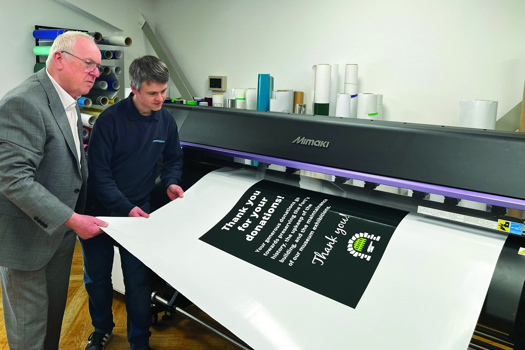Ricoh developed a 3D printed prototype face shield in under 24-hours and the design has now been approved for mass production following testing at The Royal London Hospital.
Mark Dickin, additive manufacturing & moulding specialist at Ricoh 3D, said: “Our site is uniquely set up to take a product from concept to prototype to serial production, and that is exactly what we have done.
“Local suppliers for the foam, elastic strapping and visor components have come forward across our production print, design solutions and quality assurance networks.”
Initially the company is producing 1,000 shields per week by using its 3D printers, but from the 20 April it will go into full production at its injection moulding facility in Telford, which produces 5m mouldings per month for Ricoh’s toner business. The facility has the capability to produce 40,000 face shields a week.
While 3D printer manufacturer Massivit has mobilised its network of 100 customers and shared optimized 3D print files, screen cutting files and instructions on its website to enable users to support their local health workers with face shields.
Meanwhile engineers at cutting table manufacturer Blackman & White (B&W) have developed their own face shield design which, subject to approval, they hope to start producing at the firm’s demo facilities in Maldon, Essex, once they source suitable material and identify hospitals in need of PPE.
B&W director Eiko White, said: “We can easily make 300 per day, but we are struggling to source the right quality material - this is where we need help. 1mm polycarbonate or 1mm acetate are the big stumbling blocks.”
However, raw material supply is proving less of an issue for substrate supplier and converter Gardiner Graphics Group, which has repurposed its Plymouth base to produce up 20,000 face shields per day.
It has also has capacity to supply flat sheets of prepared PET to other companies looking to produce PPE.
CEO Tom Powell said: “With such a vast stock of PET right here in the UK and the machinery suited to the job, we recognised the increasing demand for PPE items and wanted to help.
“To have all the materials and equipment to repurpose into a much-needed item seemed the right thing to do.”
Paper merchants including Antalis and Premier are also pulling out the stops to help customers plug the NHS’s PPE gap.
Antalis was approached by Faye McCallum, a creative designer and prop maker for Middlesex-based Data Reprographics, after a family member asked her if she might be able to make face shields while she was self-isolating.
McCallum started making the shields in her dining room, using off-cuts of material she had from work. However, as more requests for shields came in she roped in her family, friends and Data Reprographics colleagues to scale up ‘production’ and with materials donated by Antalis and others they collectively managed to produce 2,000 shields in a matter of days, with another 4,000 set to be delivered this week to mainly London hospitals.
The next batch of Antalis donated Foamalite and hook and loop systems is now on its way to McCallum’s 100-strong team for the next batch of homemade PPE.
A JustGiving page has been set up to raise funds to support production.
Premier Paper, meanwhile, has supported South Wales-based commercial and POS printer Lexon with enough 470mic gloss clear Viprint, to produce 10,000 protective visors for the NHS.
Premier marketing director Dave Jones said: “When the call came in from Lexon for direct support to help protect our NHS workers who are on the front line of fighting Covid-19, then we were delighted to be in the position to offer help.”










